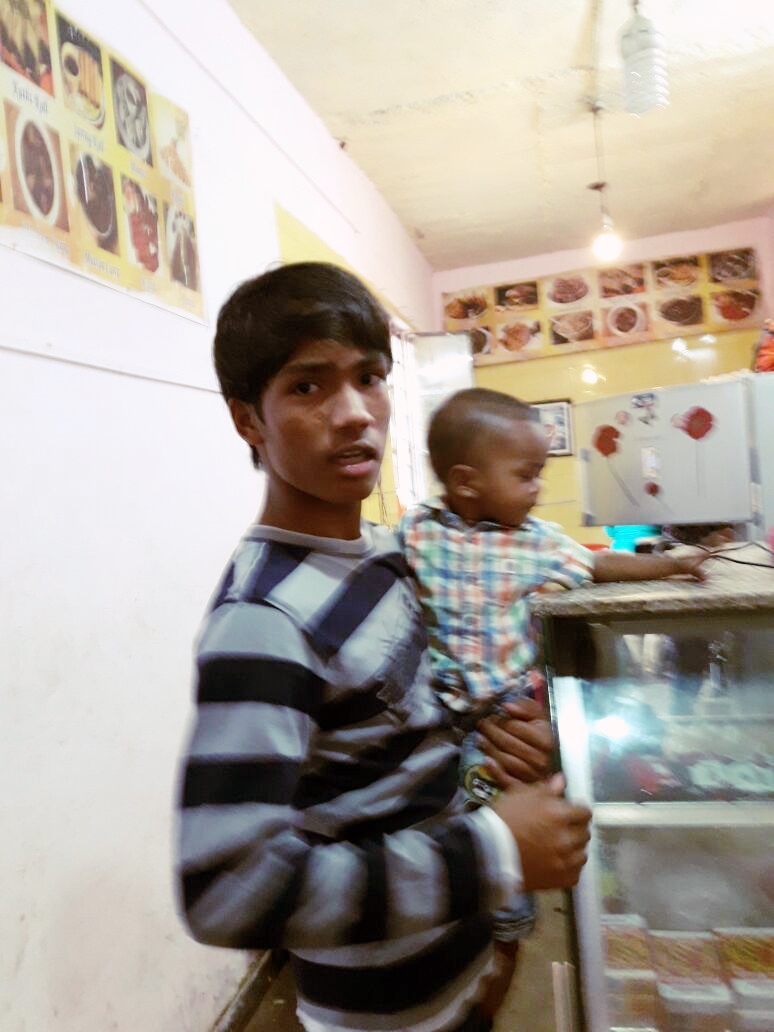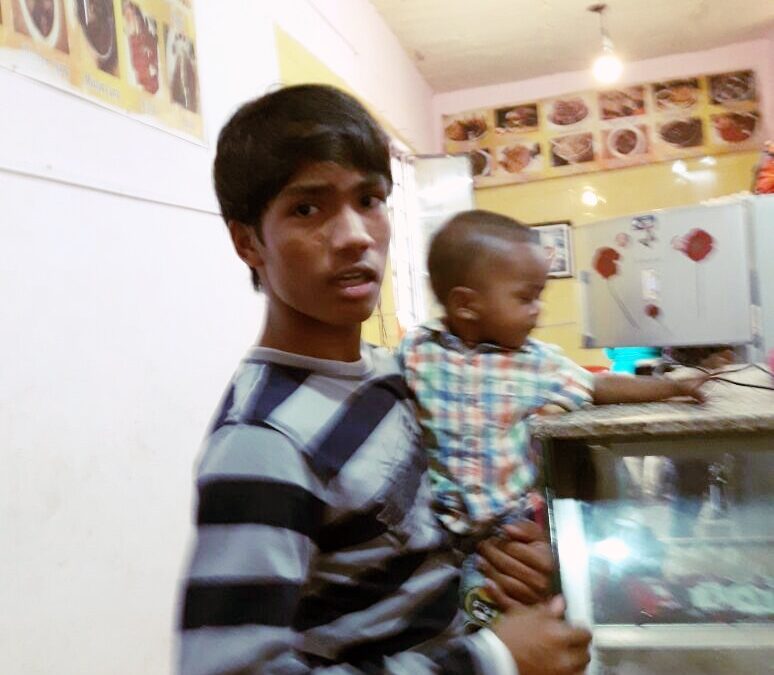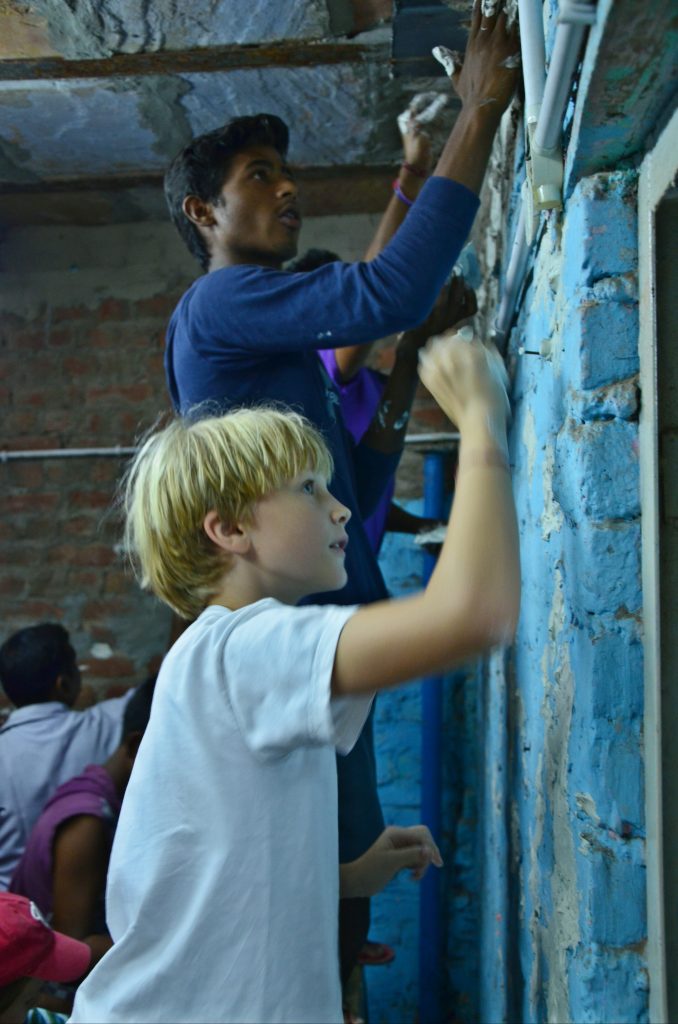 Like any teenager, Utpal often calls from boarding school to ask for something or the other usually food as at his age kids seem perpetually hungry or for a book of some kind. So when he called last week we were expecting ‘chips’ or ‘cookies’ and were very surprised when the demand was ‘toys’ for a toddler. He knew there were some in the store room, relics of years gone by as the grandson and he became big boys.
Like any teenager, Utpal often calls from boarding school to ask for something or the other usually food as at his age kids seem perpetually hungry or for a book of some kind. So when he called last week we were expecting ‘chips’ or ‘cookies’ and were very surprised when the demand was ‘toys’ for a toddler. He knew there were some in the store room, relics of years gone by as the grandson and he became big boys.
The toys were meant for the son of the sister of the lady who runs the canteen, one of his favourite place! Utpal had made friends with little Deepak and in true Utpal style had adopted him. When we visited the canteen with the toys of course we were taken aback when the little fellow jumped out of his mom’s lap and straight into Utpal’s arms. This brought a huge smile on our faces and even a lump in our throats. The love between the two was palpable and quickly confirmed by the mom when she told us that if the little child cried all you had to say was that Utpal was there and the tears stopped mid cheek and little eyes darted in all direction.
Utpal has always been a kind and warm hearted child always willing to share. In spite of being a cool teenager his love for younger children is remarkable and the patience and kindness he shows are moving.
One wonders if compassion is taught or innate. This is a difficult question as in this day and age one sees too little of it around.
Perhaps a bit of both.
One wonders how some children show compassion at an early age. In our list of volunteers we have many children, some now quite grown up but still as compassionate. We have had children who have given up birthday presents and asked their friends to donate to Project Why, we have had children who have sold lemonade or baked cakes to collect money for us. Some older ones have come and taught at Project Why giving up their precious school holidays.
I remember the little girl in an orphanage our school use to take us to when we lived in Saigon who undoubtedly played an important part in making me who I am. I am still haunted by her beautiful black eyes that crinkled when she saw me and smiled. That smile is seared in my heart.
Education is not just teaching the famed 3 Rs. Children have to be taught values and this can only happen if parents and school make that effort wholeheartedly.
I was impressed by an initiative taken St Louis where my grandson lives. It is called READ – RIGHT – RUN. The program’s goal is to develop reading-proficient, community-minded and physically fit children in grades K-5 by challenging them to READ 26 books, RIGHT the community with 26 good deeds, and RUN 26.2 miles over a six-month period. My 6 year old grandson participated and made grandma proud. How wonderful if we had a similar programme for all our children.
It is our duty as elders to teach compassion to our children.
Agastya’s first school was the Project WHY creche and his interaction with children from less privileged homes opened his heart forever.
It is important to water the seed of compassion every child carries in her/his heart and to do that it is imperative to answer disturbing questions with honest answers. Hiding reality or shielding children does more harm than good.
How compassionate a child can be best exemplified in Malte’s story:
Malte was eight when he arrived in Delhi with his parents to live here for four years. The small German boy immediately fell in love with the country. He enjoyed everything: the food, the music, Bollywood movies, the temples, mosques and bazars. Being blond he always attracted a lot of attention everywhere he went. So after a little while he could lead expert conversations on Bollywood actors or cricket with everyone and was blessed with tons of caring kindness.
The only issue that really disturbed him and made his life miserable in Delhi was to see all the poverty and suffering in the streets. Every afternoon returning from his privileged school in Chanakya Puri he passed by a busy traffic light seeing the same beggar children asking for money. It broke his heart to see and hear of their daily struggle. Why did he have such a privileged and enjoyable life while these children of the same age did not even have shoes to wear or clean water to drink. So his sister and he came up with the idea to make small packages of dry fruits to hand out to the street children. But still, that did not feel enough, they were fast finished and nothing had changed. Too much misery for these small packages of sweetness.
When his mother started to work with Project Why Malte heard a lot of slum children also having a difficult life but now thanks to Project Why with a chance to learn and alter their future. One Saturday morning he came along and saw by himself how a small group of committed people was trying to make a longer-lasting difference for a lot of kids. He was amazed to meet with the children, see their smiles on their faces and their eagerness to learn. A couple of weeks later he took his cub scout group to white-wash the newly renovated Okhla Centre. They all joined hands with the Project Why children to make the centre colourful and even more a happy place to be. And he felt a deep joy. He finally found a way and place where poverty was not accepted as a fate but as challenge to overcome! And where he – a ten year old boy – could make a difference.
So he decided with his 2 friends Stefan and Scottie to do even more. They came up with the idea of running a donation drive in their school. They designed colourful posters to show Project Why’s work, asked the special kids to colour and decorate traditional piggy banks (gulak) to collect donations. With everything prepared they got up really early for one week during the freezing month of December, built up their stand at the school entrance and asked all children, teachers and parents passing by to give a donation for Project Why. Even the school principal and the American Ambassador were impressed and eagerly squeezed their donation in one of the gulaks. And with raised funds Project Why could buy a Bamboo roof for the Okhla centre giving shelter to the students during the harsh summer and winter months.
Since then Malte feels part of the Project Why family, asking about the different children, always happy to join his mother for a visit. Again and again he gives away his pocket money to buy school supplies. And every time he is overwhelmed by the poverty in India he thinks of something new he can do for Project Why knowing that at least his friends there will enjoy a different future.
So how do children like Utpal and Malte, both from opposite sides of the world learn compassion?
My guess is that they are the blessed few who see with their hearts.


